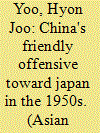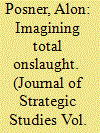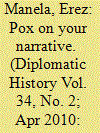| Srl | Item |
| 1 |
ID:
137183


|
|
|
|
|
| Summary/Abstract |
This article explores why the People's Republic of China employed a surprisingly soft and lenient policy toward Japan in the 1950s despite their historical and political animosities. Relying on a relatively new concept in the study of international relations, I argue that China's conciliatory policy toward Japan represented a wedge strategy that was designed to detach Japan from the United States and weaken the US-Japan alliance. The logic of the theory also reveals that China's policy was in line with its “united front” against the United States during the Cold War.
|
|
|
|
|
|
|
|
|
|
|
|
|
|
|
|
| 2 |
ID:
193164


|
|
|
|
|
| Summary/Abstract |
The Apartheid-era South African military (SADF) underwent dramatic peacetime changes, from a small and underfunded expeditionary element of Commonwealth forces in the 1950s to a regime bulwark with regional capabilities under ‘Total Strategy’ in the mid-1970s. By comparing internal assessments, changes in the SADF’s official view of future wars are traced through security crises of the 1960s and 1970s. Shifting future war perceptions were shaped by the interplay of organizational-political needs during crises of legitimacy for the military. These shifts in future war perception motivated strategic and operational-tactical doctrinal change and shaped the military’s view of security crises.
|
|
|
|
|
|
|
|
|
|
|
|
|
|
|
|
| 3 |
ID:
095527


|
|
|
|
|
| Publication |
2010.
|
| Summary/Abstract |
When Dr. Viktor M. Zhdanov, Deputy Minister of Health of the Soviet Union, arrived in Minneapolis, Minnesota, in May 1958 to attend the annual meeting of the World Health Assembly (WHA), the governing body of the World Health Organization (WHO), the visit was not routine.1 Reflecting Soviet premier Nikita Khrushchev's new policy of "peaceful coexistence" with the West, it marked the first time that a Soviet delegation had been sent to that forum since the establishment of the WHO ten years earlier.2 And Zhdanov made his mark, calling on the organization to launch a global campaign to eradicate smallpox, one of humankind's oldest and deadliest diseases. Mindful of the meeting's venue, he began his call with a quote from a letter that U.S. president Thomas Jefferson had written to Edward Jenner, discoverer of the smallpox vaccine, more than a century and a half earlier. The discovery, Jefferson had written the English physician in 1806, would ensure that "future nations will know by history only that the loathsome small-pox has existed.
|
|
|
|
|
|
|
|
|
|
|
|
|
|
|
|
| 4 |
ID:
138293


|
|
|
|
|
| Summary/Abstract |
This article reviews Joseph Jockel’s classic study of bilateral Canadian–American defence arrangements during the early Cold War: No Boundaries Upstairs. It considers the political context in which Jockel wrote and highlights the bilateral experiences that contributed to his unique perspective. It also reviews Jockel’s account and analysis of the evolution of Canadian–American continental defence cooperation from 1945 to 1958. Finally, this article describes the longevity of Jockel’s analysis as well as how historians and political scientists continue to build on his research.
|
|
|
|
|
|
|
|
|
|
|
|
|
|
|
|
| 5 |
ID:
181050


|
|
|
|
|
| Summary/Abstract |
The libraries at top private and public research universities in the United States hold some of the most comprehensive collections in the world for studying other regions and their modern histories. Yet how this came to be has been largely overlooked. This article unearths the history of the Public Law 480 Program, also known as Food For Peace or PL-480, and how it came to support the large-scale acquisition of Arabic books through a center opened for this purpose in Cairo, Egypt. The article explores the changes in US food exports, specifically wheat, and links these changes to PL-480, US foreign policy, and finally Arabic book acquisitions for US research libraries. By drawing on a variety of publicly available primary sources, as well as a series of interviews with the current and former directors of the Cairo acquisitions center, this article lays out the history of this unorthodox program and its outsized impact on area studies programs in the United States, with a specific focus on Middle East Studies.
|
|
|
|
|
|
|
|
|
|
|
|
|
|
|
|